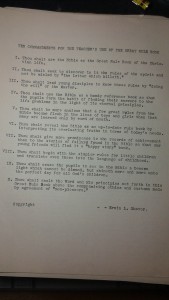Sorting through the boxes of papers left by her mother Gerry, Wendy found a stack of material that Mom had used in her Sunday School classes. Among those old papers, I found this intriguing piece (clicking on it will reveal a larger image), attributed to Erwin L. Shaver, a pioneer in the Weekday Religious Education program of the ’40s–a program still operative in at least four states (Indiana, Kansas, Ohio, and Virginia).
This text is titled, “TEN COMMANDMENTS FOR THE TEACHER’S USE OF THE GREAT RULE BOOK.” If there was any doubt as to the Book being referenced, the “first commandment” reads,
Thou shalt use the Bible as the Great Rule Book of the Christian life.
This is not the first time I have seen the Bible described as a rule book or instruction manual, of course. A popular humorous piece claiming to present “The Entire Bible Explained In One Facebook Post” essentially summarizes God’s message to humanity as “Don’t do the things.” Not long ago, when I asked a study group to reflect on what the Bible is, one participant responded: “The BIBLE is God’s Book of Instructions Before Leaving Earth.”

This perception of the Bible is neither modern, nor American. Pioneering astronomer Galileo Galilei (1564-1642) famously wrote in a letter to the Grand Duchess Christina (1615; quoting a private conversation with Cardinal Cesare Baronius ), “La Bibbia ci insegna la via per andare in cielo, non come il cielo sia fatto“–commonly translated,
The Bible teaches us how to go to heaven, not how the heavens go.
For Galileo, science tells us how to understand nature in this world, while the Bible tells us how to prepare for the world to come–once more, the Bible is a rule book.
John Wesley, leader of the Wesleyan revivals in eighteenth century England, spoke similarly of the Bible as a guidebook to the afterlife:
I have thought, I am a creature of a day, passing through life as an arrow through the air. I am a spirit come from God, and returning to God: just hovering over the great gulf; till, a few moments hence, I am no more seen; I drop into an unchangeable eternity! I want to know one thing–the way to heaven; how to land safe on that happy shore. God himself has condescended to teach me the way. For this very end He came from heaven. He hath written it down in a book. O give me that book! At any price, give me the book of God! I have it: here is knowledge enough for me. Let me be homo unius libri [that is, “a man of one book”]. Preface to Sermons on Several Occasions, 1746.
At least in this essay, Wesley too seems to present the Bible as a rule book for how to go to heaven.
The problem, apparent to anyone who has actually sat down to read the Bible through, is that it is not a rule book–at least, not in any simple, straightforward sense. While some portions of the Old Testament can be identified as rules or laws (notably, the books of Leviticus and Deuteronomy), large sections of Scripture are not laws at all.

For example, the very first book of the Bible presents not rules, but a story: the story of Israel, from the beginnings of creation (Gen 1–3) to the ancestry of Abraham (Gen 11:25-32) to the lives of Abraham’s descendants, culminating in the family taking refuge in Egypt, led by Abraham’s great-grandson Joseph (Gen 46–50). Along the way, the stories of Abraham’s family certainly do not serve as moral lessons (Jacob, for example, is a scoundrel!). But they do demonstrate God’s faithfulness to God’s promises.

Similarly, while some parts of the New Testament may fit the bill as setting forth rules for life (for example, the Sermon on the Mount in Matt 5–7, or the book of James), much of it does not. The Gospels, for example, are primarily narratives of Jesus’ life, and in Matthew, Mark and Luke, Jesus teaches not by setting forth rules for life, but by telling stories called parables (see Mark 4:34; Matt 13:34). Once more, the Bible does not so much present rules to follow as tell a story about what a life lived in relationship to God is like.
Even those texts which certainly qualify as rules sometimes conflict, or are even abrogated–that is, set aside–by later texts. For example, Deuteronomy 23:1-8 (23:2-9 in Hebrew) states clearly the makeup of Israel’s qahal: a term used both for a division in battle and for the worshipping congregation. Specifically barred from participation are eunuchs:
No man whose testicles are crushed or whose penis is cut off can belong to the LORD’s assembly (Deut 23:1[2]).
Yet, despite the clear and explicit teaching of the Torah, Isaiah 56:3b-5 states:
. . . don’t let the eunuch say,
“I’m just a dry tree.”
The Lord says:
To the eunuchs who keep my sabbaths,
choose what I desire,
and remain loyal to my covenant.
In my temple and courts, I will give them
a monument and a name better than sons and daughters.
I will give to them an enduring name
that won’t be removed.

Why would the prophet directly contradict the Torah? The answer lies in the different context of this oracle. Likely, Isaiah 56 addresses the community in the days after the return from exile in Babylon, when Israel was rebuilding its culture as well as its towns and temple. Some of those returnees would have been persons who had attained significant positions in the Babylonian bureaucracy, an honor that could carry with it a significant personal sacrifice: to ensure the king’s bloodline, and to restrict the temptation to rebellion, such persons–particularly those whose duties brought them into contact with the queen–could be castrated (see 2 Kings 20:18//Isaiah 39:7). As eunuchs, they would have been barred from the congregation as ritually defiled. But the prophet declares that other things are more important than ritual law: loving what God loves, honoring God’s sabbath, and loyalty to the covenant. Far from rejecting these persons, the prophet affirms them, and assures that, despite being childless, their names would be remembered in Israel.
This is far from the only time in Scripture that one passage takes issue with another, based on what is deemed most important. In 2 Chronicles 30:15-22, King Hezekiah of Judah invites all Israel to celebrate the passover in Jerusalem. When he learned that some “hadn’t purified themselves and so hadn’t eaten the Passover meal in the prescribed way” (2 Chr 30:18)–that is, in violation of the rules of Scripture (see 2 Chr 30:5)–Hezekiah’s response was not to expel them. Instead,
Hezekiah prayed for them: “May the good LORD forgive everyone who has decided to seek the true God, the LORD, the God of their ancestors, even though they aren’t ceremonially clean by sanctuary standards” (2 Chr 30:18-19).
The Lord heard the king’s prayer, and the community was healed (2 Chr 30:20; compare 2 Chr 7:14).
Often in the Bible, interpreters of Scripture look beneath the rules for the RULE, if you will. So, the prophet Micah asked, “What does God truly want?”
With what should I approach the Lord
and bow down before God on high?
Should I come before him with entirely burned offerings,
with year-old calves?
Will the Lord be pleased with thousands of rams,
with many torrents of oil?
Should I give my oldest child for my crime;
the fruit of my body for the sin of my spirit?
He has told you, human one, what is good and
what the Lord requires from you:
to do justice, embrace faithful love, and walk humbly with your God (Micah 6:6-8).
Jesus too sets aside strict legalism, seeking the heart and spirit of God in Scripture. Six times in Matthew 5:21-48, Jesus says, “You have heard that it was said,” quotes a passage from the Scriptures, and then declares, “But I say.” Jesus reads specific texts of the Bible in the light of the highest ideals of justice upheld in the whole of Scripture, seeking God’s intention and desire. Jesus does not take the Bible literally. He takes the Bible seriously.
In Erwin Shaver’s second commandment for teachers, he urged, “Thou shalt seek to discover in it [that is, in the Bible] the rules of the spirit and not be misled by the ‘the letter which killeth'” (the reference is to 2 Corinthians 3:6 in the KJV). Indeed, for all Shaver’s disparaging words about exalting “the Word and His principles set forth in this Great Ruler Book above the compromising ethics and customs made by agreement of ‘men-pleasers'” (his tenth commandment; the reference is to Colossians 3:22//Ephesians 6:6 in the KJV), his sixth commandment reads, “Thou shalt reveal the Bible as an up-to-date rule book by interpreting its everlasting truths in terms of today’s needs.” Mr. Shaver knew that Scripture calls for interpretation, not mechanical, rote application.
So too, in the preface to his Sermons, John Wesley acknowledged that understanding the meaning of Scripture calls for more than rule-following:
Is there a doubt concerning the meaning of what I read? Does anything appear dark or intricate? I lift up my heart to the Father of Lights:—“Lord, is it not Thy word, ‘if any man lack wisdom, let him ask of God?’ Thou givest liberally, and upbraidest not. Thou hast said, ‘if any be willing to do Thy will, he shall know.’ I am willing to do, let me know Thy will.” I then search after and consider parallel passages of Scripture, “comparing spiritual things with spiritual.” I meditate thereon with all the attention and earnestness of which my mind is capable. If any doubt still remains, I consult those who are experienced in the things of God: and then the writings whereby, being dead, they yet speak. And what I thus learn, that I teach.
May we turn to the Bible, not as an inflexible book of rules, but as an invitation into relationship with the God of Scripture. Only then will we understand what the Bible truly is.
